
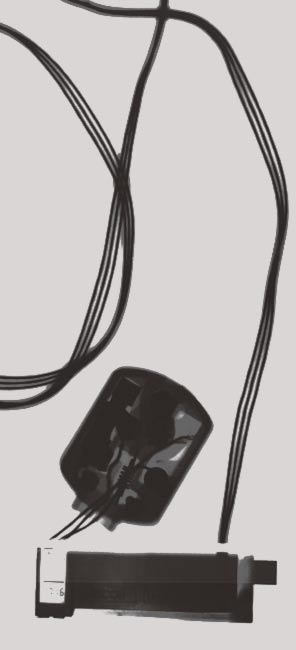

 |
||||||||||||||||||||||||||||||
| RELEASE | ||||||||||||||||||||||||||||||
ALAN WILDER - on his own November 1997 Written (and translated from Swedish) by Mikael Kahrle |
||||||||||||||||||||||||||||||
| LIFE AFTER DEPECHE MODE | ||||||||||||||||||||||||||||||
| In 1995, Alan Wilder left one of the world's most successful groups and after 13 years in Depeche Mode, he was suddenly on his own. There are many who have wondered what he's been up to since then. Now we get the answer in the form of 'Unsound Methods', the fourth Recoil album but the first where Wilder has been able to put all his power and energy into this solo project. | ||||||||||||||||||||||||||||||
| I call Alan Wilder at his home on a Friday afternoon and we start to talk. And talk. He says he has only given one interview so far and that he is looking forward to the promo. tour that lies ahead. And Wilder is nice. He talks a lot and is not reserved. The one usually found behind his machines looking so serious, seldom giving interviews and preferring life in the studio. | ||||||||||||||||||||||||||||||
| Music
has always been an important part of Alan Wilder's life for as long as he
can remember. Unlike the others in Depeche Mode, he already had something
to fall back on before he started playing in a band. |
||||||||||||||||||||||||||||||
| "I took classical piano lessons for several years when I was a child and I also studied the flute in school up to grade eight. This training has always been useful to me and I really value having it to fall back on." | ||||||||||||||||||||||||||||||
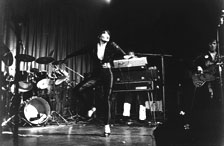 |
||||||||||||||||||||||||||||||
| Before Depeche Mode, Wilder was in many bands, among them Dafne & The Tenderspots, Real To Real and The Hitmen. | ||||||||||||||||||||||||||||||
|
|
||||||||||||||||||||||||||||||
 |
||||||||||||||||||||||||||||||
| The dedicated Wilder fan might want to look up the Real To Real LP 'Tightrope Walkers' from 1979 or The Hitmen single 'Bates Motel' from 1980. Or maybe The Korgi's single 'If I Had You', where Wilder is present, but not listed as a member. | ||||||||||||||||||||||||||||||
|
|
||||||||||||||||||||||||||||||
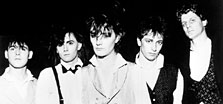 |
"The Hitmen was a group I joined pretty late in their existence and I wasn't with them especially long either. I was in and out of many different groups during my time before Depeche Mode. I started my career working in a studio when I was 17. It gave me experience which was useful when I played with all these bands and it finally led to my membership in Depeche Mode. | |||||||||||||||||||||||||||||
|
|
||||||||||||||||||||||||||||||
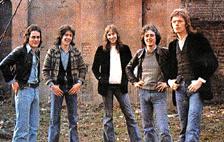 |
||||||||||||||||||||||||||||||
| Even if these other bands weren't successful, being in them was a good experience. This was a period in my life when I learned a lot of things." | ||||||||||||||||||||||||||||||
|
|
||||||||||||||||||||||||||||||
| Were
any records released by your old bands? "Oh yes, but there wasn't much more than one record per group." |
||||||||||||||||||||||||||||||
| Alan
Wilder did not join Depeche Mode until the 'See You' tour 1982. They advertised in Melody Maker for a new member after Vince Clarke had left. Wilder answered the ad. but they were specifically looking for someone under the age of 21. Alan Charles Wilder was born on 1st June 1959 but desperately needed to get the job so he lied about his real age. And got away with it. |
||||||||||||||||||||||||||||||
| He was not initially a full member of Depeche Mode. His tasks were limited to live appearances. After the tour, Depeche Mode released their second album 'A Broken Frame' without Wilder. He claims that they excluded him from the album to demonstrate to Vince that they had managed to make a record without him. However, Wilder's responsibilities were to became much more significant. | ||||||||||||||||||||||||||||||
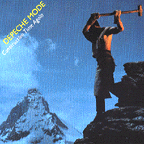 |
||||||||||||||||||||||||||||||
| Mute Records officially announced that Alan Wilder was a full member after 'A Broken Frame' was released and the first song he really worked on was 'Get The Balance Right'. He also co-wrote the B-side 'The Great Outdoors'. In the subsequent years he continued to contribute to the song writing. | ||||||||||||||||||||||||||||||
| Wilder has written or co-written 'Two Minute Warning', 'The Landscape Is Changing', 'Fools', 'Work Hard', 'If You Want', 'In Your Memory', 'Christmas Island', 'Black Day' and 'Stjarna' (from the Swedish 'stjärna' meaning 'star'). He also performed Beethoven's 'Sonata No. 14 in C#m' (The Moonlight Sonata) on the 'Little 15' single but reveals that it was actually Martin Gore's idea to record it. | ||||||||||||||||||||||||||||||
| After being one of four members of Depeche Mode for a large part of his life, Alan Wilder left the group in 1995. | ||||||||||||||||||||||||||||||
| He explains that he was completely exhausted after the tough, 18 month long 'Devotional' tour which had also left the rest of Depeche Mode nervous wrecks. David Gahan's drug addiction and suicide attempt naturally qualified him as the worst wreck of them all but for Wilder, things weren't all positive just because he left the, then apparently, sinking ship. As the remaining members tried to get over their troubles, Wilder did the same and gave himself time to make a priority of his private life. | ||||||||||||||||||||||||||||||
"This was a strange period in my life. Initially, I needed a real break after the 'Devotional' tour and secondly, I went through a divorce. The third thing that happened was that I had a daughter by my new girlfriend, Hepzibah. Because of the divorce situation, I didn't have access to my own studio which was very frustrating. Although it was a traumatic time, I am happier than ever. Having a child, for instance, is a fantastic experience." |
||||||||||||||||||||||||||||||
While the remaining three quarters of Depeche Mode, miraculously, managed to get on their feet again, Recoil also delivered a new record. |
||||||||||||||||||||||||||||||
It was only a year ago that the new Recoil album went from thought to action, almost a year after Depeche Mode started making 'Ultra' (with much-needed assistance from a team of outside programmers who were required to replace Wilder). The new Recoil album 'Unsound Methods' has some similarities with Depeche's 'Songs Of Faith And Devotion'. |
||||||||||||||||||||||||||||||
| How
does he look back on his departure from Depeche Mode today, now he has some
perspective on the situation? "I think it was a very wise decision because I feel much better now that I'm no longer in that group situation." |
||||||||||||||||||||||||||||||
| So
you haven't regretted it, if only for a brief moment? "No, never." |
||||||||||||||||||||||||||||||
| Can
you imagine yourself joining the band again in the future if circumstances
were different? Or maybe to work with Depeche Mode in some way other? "I strongly doubt that it will ever happen. For me, I really consider Depeche Mode part of my history." |
||||||||||||||||||||||||||||||
 |
||||||||||||||||||||||||||||||
| Is
your friendship with the others over? "No. At the end of my time as a member of Depeche Mode, things happened without me being able to influence them. I had this strong feeling that I didn't want to be in a band any more. I felt I couldn't develop myself as a musician in a band situation and it was time to do something else. I simply needed a change. I was tired of being in Depeche Mode and I wasn't particularly enjoying it. It was not a question of falling out with anyone. It was a question of moving on." |
||||||||||||||||||||||||||||||
Have you heard the new Depeche Mode album and do you want to comment? "I've heard it of course, but I'm not going to say anything. Its not a fair question." |
||||||||||||||||||||||||||||||
| Are
there some other reasons for your departure other than those you mentioned
in your official statement? "No. I can understand why people ask me this and I can understand the curiosity. All bands have their share of difficulties and we had ours - some of them are very well documented but there's no more to it. I have nothing to say against the others and I am very grateful for the years Depeche gave me." |
||||||||||||||||||||||||||||||
| Do
you see the other Depeche Mode members nowadays? "I haven't seen them that much but I've spoken with Dave and I met Martin and Fletch at the Mute Christmas party. I guess all of us have been busy doing our own things." |
||||||||||||||||||||||||||||||
| David
Gahan is back on his feet and seems to be ok now. "Yes, it really pleases me to hear that. It means a lot to me. Obviously it was a difficult situation he put himself in and I'm glad he managed to get out of it so well." |
||||||||||||||||||||||||||||||
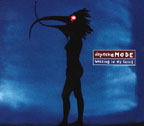 |
||||||||||||||||||||||||||||||
|
If you look back, now that you've
put some distance between yourself and Depeche Mode, which record or period
are you most proud of?
"I must say that I think 'Songs Of Faith And Devotion' and 'Violator' are the best albums Depeche Mode has ever made." |
||||||||||||||||||||||||||||||
| "Many of the songs from SOFAD sound good even today, especially 'Walking In My Shoes' and 'In Your Room' and also some from 'Violator' although I think the drums sound too precise now. I also like 'Stripped' and 'Never Let Me Down Again' but I have a tendency to hold the latest achievements highest because I would like to believe we constantly improved ourselves." | ||||||||||||||||||||||||||||||
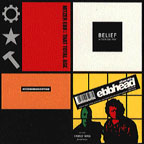 |
||||||||||||||||||||||||||||||
| Some people thought Alan Wilder would start working as a producer after he left Depeche Mode. He had produced on one previous occasion together with Flood for the 1991 Nitzer Ebb album 'Ebbhead'. Wilder also helped them with the mini-album 'As Is' which came out shortly before. | ||||||||||||||||||||||||||||||
| Depeche Mode and Nitzer Ebb had known each other for a long time after Nitzer Ebb supported Depeche Mode for parts of the 'Music for the Masses' and 'Violator' tours. | ||||||||||||||||||||||||||||||
| "I have had some offers to produce other groups but a production assignment takes a lot of time and energy and I'd rather put that into a project of my own. If I started working as a producer, it would almost put me in the Depeche Mode situation again and I'd be forced to put everything else aside throughout the assignment. Whatever I choose to do, I always try to do it properly and consider it thoroughly." | ||||||||||||||||||||||||||||||
But there must be production assignments that you just couldn't refuse, like working with Kraftwerk for instance? "Well, yes I couldn't refuse them of course. It really would have to be someone very special because I would want give another artist's record the same amount of time and energy as my own." |
||||||||||||||||||||||||||||||
| Could
you tell me about the offers you've had? "Front 242 have asked me twice. Stabbing Westward were interested. It seems to be a certain kind of artists that looks me up - artists who are into electronic, industrial music." |
||||||||||||||||||||||||||||||
| Depeche
Mode and yourself are respected by many but the ones who respect you the
most are those who love electronic music. Do you agree? "Yes, that's probably true. I produced Nitzer Ebb so I suppose it is understandable that similar bands want to be produced by me." |
||||||||||||||||||||||||||||||
| What
equipment do you use? "I use a combination of, say, 75% samplers and 25% other instruments including analogue synthesisers, guitars and drums. I work with an Emulator and two Akai S3000's. It's pretty simple actually. All of it is put together in a Macintosh computer where I save everything to the hard disc, including the vocals. I run everything 'live' so I always have the possibility to go back and re-structure whenever I wish and I'm the kind of person that does that all the time. For example, I might suddenly want to change the length of the chorus from two minutes to one, which is very easy when you work the way I do." |
||||||||||||||||||||||||||||||
Isn't it hard to still feel the same curiosity and desire for making music after such a long time? There must be certain stages of the process that you've been through thousands of times. "No, it's not a problem. Every piece of music that I work with brings something new and different. I think it's as exciting now as ever. I constantly get a kick out of making music. If you are always trying to better yourself, I guess it becomes harder and harder. I'm always looking for that special spark in the music that lays the foundation for something - that's the most remarkable moment in the writing process and nothing afterwards ever beats that feeling. You fiddle about until you find that certain something that sends a shiver up your spine. The rest is actually just a matter of fleshing out the bones." |
||||||||||||||||||||||||||||||
But it must have been different back in the eighties when, for example, the sampler arrived and you yet had many new things to explore? Didn't new instruments and equipment give you a kick as well? "Sometimes new technology can inspire. It does happen that new technology arrives that can help you accomplish something that has never been done before. I must admit that it was a very exiting time when Depeche Mode got samplers in the beginning of the eighties. We acted like enthusiastic children and ran outside as often as we could to hit and kick things to sample. It may sound naive today but back then, sampling was something completely new. The sampler is a fantastic piece of machinery because it gives you the chance to work with any sound whatsoever. The sampler has no limits. The thing is to keep an open mind and try to find out new ways of doing things and then the sampler is merely the tool that transforms your ideas into action. The most important thing is to use your imagination." |
||||||||||||||||||||||||||||||
Wilder says that there is still much to be done that hasn't been done before. "Like drum loops, which I work a lot with. In the past you sampled an individual sound and then played it like you play a synthesiser. Today you can sample a whole range of sounds and loop them all together instead. It's a different and much cleverer way of using the sampler and it's really developed over the years." |
||||||||||||||||||||||||||||||
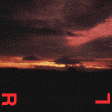 |
||||||||||||||||||||||||||||||
| When Recoil was born in the mid eighties, Wilder didn't have the time to put all his effort into the project. Depeche Mode was becoming extremely successful and for Wilder, Recoil was nothing more than relaxation in the studio. The first Recoil album showed up in 1986 and a world of Depeche Mode fans scratched their heads. '1+2' was difficult to listen to, rather short and contained mostly sound experiments. | ||||||||||||||||||||||||||||||
 |
||||||||||||||||||||||||||||||
| Recoil's second album, 'Hydrology', which arrived two years later, was easier to listen to. Both the first two records were completely instrumental. | ||||||||||||||||||||||||||||||
| I
asked Wilder how he looks back on his first two solo albums now. "The very first Recoil album was made on a four track cassette recorder and was extremely simple. It was really nothing more than experimentation with samplers - I played around to see what I could accomplish. At first, I never intended to release it. It's debut was the foundation for Recoil and I have moved on from there. The second LP was also instrumental and experimental. Around this time I felt that, because I was already in a pop group, I could be more radical with Recoil and just do whatever came to mind. I guess I didn't feel the need to produce something more complete. Nowadays I'm aware of my ability to do so much more than just experimental, instrumental music. Recoil has grown and changed a lot throughout the years." |
||||||||||||||||||||||||||||||
On the 1992 album 'Bloodline', Recoil reached new heights with the assistance of guest artists. Douglas McCarthy from Nitzer Ebb, Toni Halliday from Curve and Moby helped make 'Bloodline' interesting and varied. |
||||||||||||||||||||||||||||||
| After 'Bloodline', Depeche Mode occupied most of Wilder's time until his departure in 1995. | ||||||||||||||||||||||||||||||
| I
ask him if he had planned another Recoil album while still in Depeche Mode. "I had always planned to continue with my solo project and I probably would have done so even if I had remained in Depeche Mode. But there was a time when I wasn't sure if I should continue with Recoil or start something new and perhaps release it under my own name - as it was, I decided to carry on with what I had started. Recoil is an open concept where I can bring in different guest artists - that's really interesting for me". |
||||||||||||||||||||||||||||||
There still seems to be many people that don't know that Recoil is Alan Wilder and this is, of course, one of the reasons he thought of releasing material under his own name: "Some of the recent marketing for the new album is designed to make more people aware that it's me behind Recoil." |
||||||||||||||||||||||||||||||
| For
the first time, Recoil marketing and promotion
is now something Wilder has time for... "Now that I don't have Depeche Mode to worry about, I can give promotional activities, videos, the artwork - all those kind of things - the time they need. I've never had that option before. And above all, I can concentrate more on my music. When the promotional stuff for the new record is over, I will move on to the next record immediately. Nowadays, I don't have to give Depeche Mode three-four-five years. After 'Songs Of Faith And Devotion', we were out on the road for an eternity. Now I put myself and my private life first." |
||||||||||||||||||||||||||||||
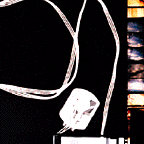 |
||||||||||||||||||||||||||||||
| The
work for the new album 'Unsound Methods' began in September '96. "Back then I started working in my home studio and did most of the album there except for the last two months finishing off at a different studio, just outside London. The mixing was completed at the beginning of June '97." |
||||||||||||||||||||||||||||||
| I
comment on the long break between June and October 27th, when the album
was released. "These days, it seems to take a long time to co-ordinate a release date. We also wanted to build up the interest for the album rather slowly, to get people to notice that something was going on before the record came out. For example, we sent two promo-CDs to the media long before the album CD was finished." |
||||||||||||||||||||||||||||||
| How
does it feel now the album is completed? "I'm very pleased with it and I still enjoy listening to the new tracks. Normally I would be dead tired of them by now. It's a good sign. One reason why the results are so interesting is that during the working process I never knew where I would end up. Things could change on a daily basis. For example, when a singer began working with a song, it could take a completely different direction than what was intended in the beginning." |
||||||||||||||||||||||||||||||
What music inspired you when you wrote 'Unsound Methods'? "Rhythms and grooves are loosely influenced by groups such as Massive Attack and Portishead, as well as hip- hop. Apart from that, I listen to a wide range of music that inspires me - for example, a lot of classical music and soundtracks. I have many in my collection. They're often much more interesting than pop records. Bernard Herrmann, who scored for Alfred Hitchcock films is a favourite of mine. He also did 'Taxi Driver'. I also enjoy composers like Shostakovich, Michael Nyman and Philip Glass. Another record I've bought lately that I really enjoy is the new Radiohead album." |
||||||||||||||||||||||||||||||
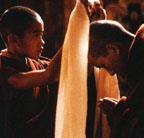 |
 |
|||||||||||||||||||||||||||||
|
|
|
|||||||||||||||||||||||||||||
| One
might think that Alan Wilder would be interested in writing soundtracks
himself. "It's something that I very well could be interested in but it would really have to be the right kind of offer from the right kind of director- one I respect. I think there is a certain risk attached to the making of soundtracks which has to do with the fact that you are dealing with film companies. So I would have to ensure that if the film project crashed, I would still have a piece of music left that would be valid." |
||||||||||||||||||||||||||||||
Alan Wilder has released all his Recoil and Depeche Mode records on Mute Records. |
||||||||||||||||||||||||||||||
| "I've always had a good relationship with Mute and Daniel Miller in particular. As long as Mute want to release my records, I'm pleased. They are very loyal to their artists and they have a good attitude. The problem with an independent company is that they don't always have the necessary finance for hard marketing. They have to be cautious if they're not sure how well an album is going to sell. | ||||||||||||||||||||||||||||||
 |
||||||||||||||||||||||||||||||
| A major company might have taken their chances on my new album - put money into the project to see if it goes well. They're able to afford to sometimes take that gamble. But the advantages with a company like Mute are greater. Above all, they give me full artistic freedom and understand what my projects are about. Our common history goes way back to the early Depeche years so I see no reason to leave Mute - if nothing drastic happens like a shift in ownership, that is." | ||||||||||||||||||||||||||||||
The music of 'Unsound Methods' is definitely hard to describe which of course can be a good thing in itself. It's also very complex. How do you describe your own music? "It's definitely hard to describe, I agree. I think my music is dark and atmospheric with a film-like touch. The most interesting part is the diversity. There are four different voices on the album. It was a challenge to keep the record together with such a large variety of styles. But I also think there is a clear continuity across the whole thing and a somewhat similar atmosphere to all the tracks." |
||||||||||||||||||||||||||||||
I think 'Unsound Methods' is more unified than 'Bloodline'. "Yes, I agree. On 'Bloodline' the vocals were added late on. It was primarily an instrumental album with the voices as an afterthought. While I was working with the new record, it became clear to me at an early stage that I would need vocals on almost every track. I wanted 'Unsound Methods' to be more a collection of real songs. Therefore the new album feels more complete than the last one." |
||||||||||||||||||||||||||||||
But the guest vocalists were invited pretty late, nevertheless? "On 'Bloodline' I began with instrumental music to see where it got me. This time I knew early on that I was going to use singers and adjusted the music accordingly. It was around January-February that I started looking for the right people. I gave them all tapes and after some time they came back to me with ideas for lyrics. Then we started to work on the vocals and recorded in my studio. I'd given them the music at a very late stage so that they would have an accurate picture of what I intended with each song. Together with the backing tracks, I also gave them basic sketches for each song's theme. |
||||||||||||||||||||||||||||||
If we take Siobhan Lynch’ s 'Drifting' for example, I told her I wanted the song to be about someone who was perhaps lonely and slightly lost. The whole album deals a lot with subjects of that nature - it's my darker side that comes forward when I make music. However, the vocalists were relatively free to do what they wanted within these borders so I didn't change their lyrics or anything like that afterwards. On occasion, I restructured the songs - moved verses and choruses and so on, but they were fully aware that eventually something like that might happen. I think they liked to have a certain degree of direction from me." |
||||||||||||||||||||||||||||||
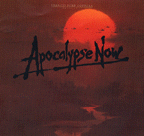 |
||||||||||||||||||||||||||||||
| Douglas McCarthy is the only guest vocalist who also contributed to the previous album. On 'Unsound Methods', the former Nitzer Ebb singer appears on the opening track, 'Incubus' - influenced by Francis Ford Coppola's famous and much-debated war movie 'Apocalypse Now'. | ||||||||||||||||||||||||||||||
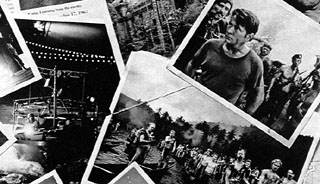 |
||||||||||||||||||||||||||||||
| Alan
Wilder confirms Nitzer Ebb is nothing more than a memory. "Nitzer Ebb doesn't exist anymore but Douglas is currently working with another group, although I don't think he wants to become a permanent member. It's a short term collaboration, like Recoil." Unfortunately, Alan doesn't recall the name of the group, but he tells me that Douglas performed with them at Tribal Gathering in England earlier this year. |
||||||||||||||||||||||||||||||
| Another guest is Hildia Cambell, who some of you might remember from Depeche Mode's 'Songs Of Faith And Devotion' and the tour that followed. She was one of two black backing vocalists. For 'Unsound Methods' she lends her voice to 'Red River Cargo' and 'Last Breath'. Wilder uses fragments from old gospel and blues classics and creates an interesting contrast to the electronic sound. | ||||||||||||||||||||||||||||||
"I knew her from Depeche Mode days but actually it's more interesting when I don't know the people I'm working with. One of the advantages is that if something goes wrong you haven't really lost anything but on the other hand, if everything goes well, you have a fresh and new collaboration. This adds a certain tension to the whole thing. I contacted Siobhan Lynch after I had heard a demo tape. Maggie Estep was a suggestion from a friend. The four differ a lot from one another which is what I was looking for." |
||||||||||||||||||||||||||||||
Maggie Estep is an artist from New York who has shown up frequently on American MTV as well as in different talkshows. "I wanted a soundtrack-kind of feel and it suited the passionate reading of text rather than singing. At first I was looking for a rapper, maybe with a different style, but then I found Maggie instead. The results were much better." |
||||||||||||||||||||||||||||||
| Wilder
has recorded more than just the album material. "I wrote another song with Hildia and some of the other songs exists as alternative versions. They have the same music but completely different lyrics and melody. It's rather fascinating actually - the reverse of the remix. You keep the music but change the entire vocal instead of keeping the voice and altering the music. Some of these versions might show up somewhere eventually." |
||||||||||||||||||||||||||||||
Toni Halliday from Curve sang on two tracks of 'Bloodline' of which 'Edge To Life' was planned as a possible second single. Wilder met Halliday via Alan Moulder (an old friend) who worked on Depeche Mode's '101'. |
||||||||||||||||||||||||||||||
 |
||||||||||||||||||||||||||||||
| But
were there ever any plans for her on 'Unsound Methods'? "No, she is busy with her own thing. She has just reformed Curve and they are working towards a new album." |
||||||||||||||||||||||||||||||
| "Actually, I wasn't going to use any of the vocalists from 'Bloodline' again. I had considered Douglas McCarthy at the beginning but I was convinced he was in the US, because he moved there. I decided it wouldn't have been worth the trouble finding him and bringing him here but just when I had started my search for vocalists, he called me one day! I had some tracks that really fitted his voice. I didn't have anything for Toni's voice this time." | ||||||||||||||||||||||||||||||
I understand that you are sceptical about working in a group again but have you, nevertheless, considered transforming the Recoil project into a real group - with perhaps Douglas McCarthy and maybe some other musicians? "No, that would be like taking one step back again. One of the reasons I left Depeche Mode was that I wanted the flexibility of constantly being able to change working methods and working partners. I don't want to be locked in a new group situation. Now I can do what I want with the project - I can take it anywhere I want. It is constantly changing into something new and unexpected." |
||||||||||||||||||||||||||||||
But of course Recoil has to be some kind of band if Wilder decides to take the project on the road? "It's the only time I would put a band together. Right now I have no intention of touring. I'm satisfied with Recoil as a studio project." |
||||||||||||||||||||||||||||||
So you wouldn't even consider, for example, a small club gig at some important occasion in London? "There are no plans at the moment but you never know - something could always turn up. If a good opportunity were to turn up to do a TV performance, I might say yes, but it's hard to get everyone involved together because they have projects of their own. Siobhan is currently working on an album and Maggie has just released an album in the US - I think it's her second." |
||||||||||||||||||||||||||||||
Now, in 1997, Wilder is 38 years old and happier than ever. |
||||||||||||||||||||||||||||||
| His daughter has reached the age where she, on one occasion, was able to cut the main power in the studio and several hours of programming was lost. She is, by the way, named Paris - after the place where she was made! She makes a discrete guest appearance in the John Clayton-directed Recoil video for 'Drifting'. | ||||||||||||||||||||||||||||||
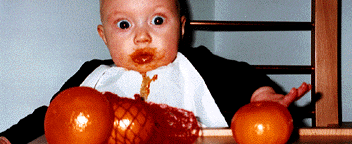 |
||||||||||||||||||||||||||||||
| Now everything revolves around Wilder's musical creativity. Everything has fallen into place and he has what seems to be a never-ending energy to create new music. | ||||||||||||||||||||||||||||||
| Many artists are usually tired of studios and programming after recording an album, especially if you're like Alan and program all your own music. But he is already dreaming of his next album. | ||||||||||||||||||||||||||||||
| Wilder lives together with his girlfriend Hepzibah and Paris in a 1930's house in Sussex, one hour south of London. | ||||||||||||||||||||||||||||||
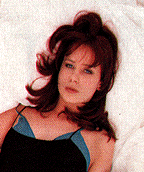 |
||||||||||||||||||||||||||||||
| It's time to finish the interview with one last question: | ||||||||||||||||||||||||||||||
| Can
you imagine a life without music? "No. Music really is my life. Naturally, I have other interests as well and my focus has slightly changed throughout the years now I have a family to care for but I feel the same enthusiasm for creating new music that I've always felt. The fact is, I think I'm even more enthusiastic now because I control everything myself. I'm already looking forward to beginning work on a new record. I have no idea what direction the music will take. What I enjoy most is making records - on my own - and that is what I intend to stick to." |
||||||||||||||||||||||||||||||